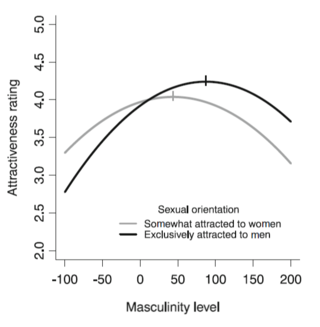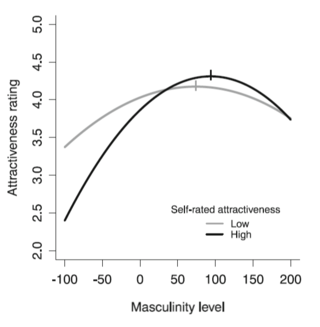Beauty
Why Certain Women Prefer a Man Who's More Feminine
New research reveals women face a trade-off when rating men's attractiveness.
Posted December 6, 2017 Reviewed by Ekua Hagan

Do women who are attracted to men prefer a macho, masculine appearance? Or is a gentler, more feminine face the ideal?
In the rest of the animal kingdom, the answer is clear: Males with exaggerated masculine traits — for example, the showy plumage of a bird of paradise or the puffed-up chest of a silver-back gorilla — are luckier in love. This is likely because there is a link between these macho traits and health and vigor. A preference for masculine traits is a preference for a male who will make a good biological father.
In our own species, perhaps unsurprisingly, the story is more complicated. Some women prefer "tough guys" and others prefer more sensitive types. Why? It could be because women face a trade-off when choosing a mate. In some circumstances, masculine qualities are more valuable. In others, a more feminine partner might be the better choice. The results of 15 years of research consistently show that women prefer masculine men more for a short-term fling than for marriage, perhaps because macho men are generally less committed.
Iris Holzleitner, a postdoc at Glasgow University, recently published the most comprehensive study yet of how women differ in their preferences for male masculinity according to circumstance.

She recruited more than 500 women for an internet study. These women rated the attractiveness of a set of male faces that had been manipulated to appear more feminine or more masculine. Masculine faces tend to have a more robust jaw, narrower eyes and lips, and a wider nose. In many research studies, volunteers are only asked to compare one feminized with one masculinized face; in Holzleitner’s study, volunteers individually rated faces of varying degrees of masculinity.
Holzleitner found that, generally, women most preferred male faces that were moderately masculine. Very masculine or feminine faces were less appealing. However, the degree of masculinity a woman preferred in a man’s face depended somewhat on her own characteristics.

For example, compared to women who were exclusively attracted to men, women who were also somewhat attracted to women rated masculine faces less attractive and feminine faces more attractive.
Women also differed in their preferences according to their own self-rated attractiveness: Women who thought they were high in attractiveness didn’t find feminine male faces very attractive at all, but less attractive women rated them moderately appealing. Both self-rated attractive and self-rated unattractive women agreed that moderately masculine men were the most appealing, and that very masculine men were slightly less so.
Women who had a high sensitivity to disgust — who were repulsed by situations and stimuli that could lead to infection — tended to prefer moderately masculine men but really didn’t like either feminine or very masculine men. However, women who were less sensitive to disgust found moderately and extremely masculine men equally alluring.

These results are interesting because they show that women are not performing a binary trade-off, preferring more macho men in one situation and less macho men in another. Instead, a woman’s personal circumstances affect her preferences to different degrees depending on the men she encounters.
The results also force us to reconsider past explanations. For example, when earlier studies revealed that less-attractive women express a lower preference for masculinity, this was interpreted as an aversion to very masculine men and their typically macho demeanor. Holzleitner’s study shows that this interpretation is probably incorrect, because women who vary in (self-rated) attractiveness agree about the allure of very masculine men; it’s only when it comes to feminine men that opinions vary.
The likelihood that attractiveness researchers will develop an aversion to studying women’s face preferences any time soon is extremely low.
Facebook image: Hrecheniuk Oleksii/Shutterstock
References
Holzleitner, I. J., & Perrett, D. I. (in press). Women’s preferences for men’s facial masculinity: Trade-off accounts revisited. Adaptive Human Behavior and Physiology.


